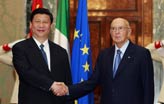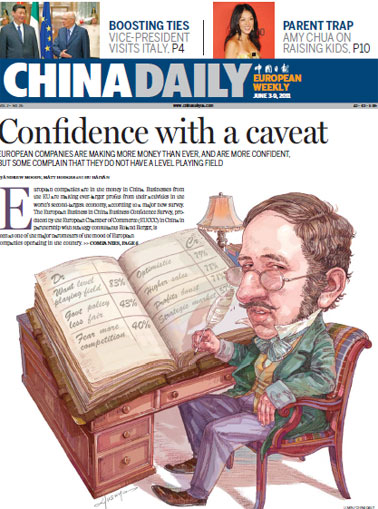Economy
High growth to continue: World Bank
Updated: 2011-06-09 09:30
By Wang Xiaotian (China Daily)
Economy to expand by 9.3% this year; room for tightening policies
BEIJING - The economy will maintain its high growth levels and the government still has plenty of room to further tighten monetary policy, World Bank economists said on Wednesday.
The economy is predicted to grow by 9.3 percent this year, before slowing to 8.7 percent in 2012 and 8.8 percent in 2013, the World Bank forecast in its twice-yearly report, Global Economic Prospects, released on Wednesday.
"What we're seeing now is a moderate slowdown," said Ardo Hansson, lead World Bank economist in China.
"A moderation in high growth is something that could be welcome."
| ||||
"We see a lot of room for further tightening", and interest rates are still 1 percentage point below the level before the crisis, and if inflation is taken into account there is scope for a further hike, Hansson said.
The government should use interest rates more than administrative measures to handle economic growth in the long term, he said.
A recent index, on factory output, raised concerns over a possible hard landing for the economy.
The purchasing managers' index, a key gauge of manufacturing activity, hit a nine-month low of 52 in May. Another index due to be released, the consumer price index (CPI), an indicator of inflation, was forecast to reach a 34 month-high of 5.5 percent year-on-year for the same month.
To soak up liquidity and curb inflation, the central bank has raised interest rates four times since October, and has also increased the reserve requirement ratio (the amount lenders must set aside) for banks eight times over the same period to a record 21 percent for major lenders.
But Hansson said the biggest risk facing the economy is not inflation, but the property market, which has been rising despite the government's cooling policies.
Hans Timmer, director of development prospects at the World Bank, said decision-makers should focus more on signs that the economy is hitting its growth limits, and indications of this are apparent not only in the inflation rate, but in the real estate market.
The economy "is cooling as we move into the second quarter, in response to policy tightening", Gerard Lyons, chief economist and group head of Global Research at Standard Chartered Bank, said in a research note.
"This is not a worry - or certainly not a worry yet - as policy tightening has been aimed at taming inflation and easing overheating pressures."
The speed with which the recent tightening in monetary policy has fed through into the economy is remarkable, he said.
"This transmission mechanism is faster than in the West. Loan quotas appear to be the reason. It could have been that the economy was about to slow anyway, but more likely it was a series of different policy tightening measures, particularly the tightening of loan quotas, and the messaging around this, as banks and firms responded."
Ma Jun, chief economist at Deutsche Bank Greater China, said a hard landing is avoidable and that tight monetary policies will probably start to ease after the third quarter, once CPI growth hits his forecast peak of 6 percent in June.
Lu Zhiming, senior economist at the Bank of Communications, said that there is no need for another hike in interest rates this year, given the signs of slowdown.
Inflation is expected to fall in the second half of the year, he said. He lowered his forecast for annual economic growth to 9.5 percent from 10 percent.
Higher commodity prices could damage global growth prospects, Justin Yifu Lin, the World Bank's chief economist and senior vice-president for development economics, said.
"Globally, GDP is expected to grow 3.2 percent in 2011 before edging up to 3.6 percent in 2012.
"But further increases in already high oil and food prices could significantly curb economic growth and hurt the poor."
The bank predicted economic growth in developing countries will slow to around 6.3 percent each year from 2011 to 2013, from 7.3 percent in 2010.
High-income countries will see growth slow to 2.2 percent in 2011, from 2.7 percent in 2010, before picking up to 2.7 percent in 2012 and 2.6 percent in 2013, it said.
E-paper

Harbin-ger of change
Old industrial center looks to innovation to move up the value chain
Preview of the coming issue
Chemical attraction
The reel Mao
Specials

Vice-President visits Italy
The visit is expected to lend new impetus to Sino-Italian relations.

Birthday a new 'starting point'
China's national English language newspaper aims for a top-notch international all-media group.

Sky is the limit
Chinese tycoon conjures up green dreams in Europe with solar panels




